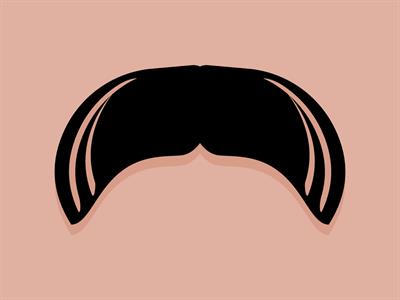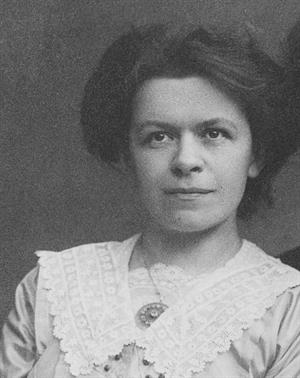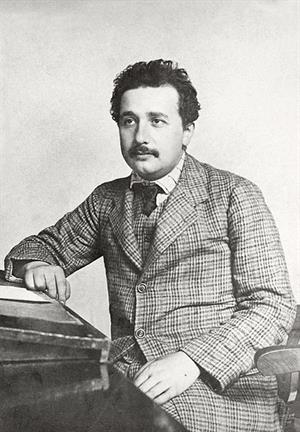PDF chapter test TRY NOW
6. Einstein was highly gifted in mathematics and interested in physics, and after finishing school, he decided to study at a university in Zurich. But science wasn’t the only thing that appealed to the dashing young man with the walrus moustache.
8. In 1900, at the age of 21, Albert Einstein was a university graduate and unemployed. He worked as a teaching assistant, gave private lessons and finally secured a job in 1902 as a technical expert in the patent office in Bern. While he was supposed to be assessing other people’s inventions, Einstein was actually developing his own ideas in secret. He is said to have jokingly called his desk drawer at work the “bureau of theoretical physics.”
7. He also felt a special interest in a fellow student, Mileva Maric, whom he found to be a “clever creature.” This young Serb had come to Switzerland because the University in Zurich was one of the few in Europe where women could get degrees.. Einstein saw in her an ally against the “philistines”— those people in his family and at the university with whom he was constantly at odds. The couple fell in love. Letters survive in which they put their affection into words, mixing science with tenderness. Wrote Einstein: “How happy and proud I shall be when we both have brought our work on relativity to a victorious conclusion.”
8. In 1900, at the age of 21, Albert Einstein was a university graduate and unemployed. He worked as a teaching assistant, gave private lessons and finally secured a job in 1902 as a technical expert in the patent office in Bern. While he was supposed to be assessing other people’s inventions, Einstein was actually developing his own ideas in secret. He is said to have jokingly called his desk drawer at work the “bureau of theoretical physics.”
Explanation:
Einstein was good at studies, and he was highly talented in solving problematic sums in Mathematics. He also had a particular interest in physics. After graduating from high school, Einstein enrolled at the University of Zurich (Switzerland). The handsome young man with the walrus moustache (a large bushy moustache resembling that of a walrus) was not only fascinated by science, but he had an interest in one of his fellow students, called Mileva Maric. He thought of her as a “clever creature” because she was a person of extraordinary intelligence and talent.

Walrus moustache
Mileva Maric and Albert Einstein met at the University of Zurich. She was referred to as a young Serb because she was from Serbia. She came to Switzerland since Zurich University was one of the few universities in Europe that provided education to female students. Mileva Maric broke out the traditions of academic institutions across Europe. She came forward to study in the polytechnic college. “She was considered the only woman in the class. She was pretty unique since not many women went to college at that time, and even fewer studied science or maths” ( *M. L., Pg. 26). Women did not go for higher education because the educational institutions never accepted them as candidates. Moreover, society had taught them that they were under the control of men, and their major duties were to bear children, take care of their family, and do household chores.
Mileva Maric and Albert Einstein met at the University of Zurich. She was referred to as a young Serb because she was from Serbia. She came to Switzerland since Zurich University was one of the few universities in Europe that provided education to female students. Mileva Maric broke out the traditions of academic institutions across Europe. She came forward to study in the polytechnic college. “She was considered the only woman in the class. She was pretty unique since not many women went to college at that time, and even fewer studied science or maths” ( *M. L., Pg. 26). Women did not go for higher education because the educational institutions never accepted them as candidates. Moreover, society had taught them that they were under the control of men, and their major duties were to bear children, take care of their family, and do household chores.

Mileva Maric*
Mileva was Einstein’s friend because she shared his interests in science, music and art. However, many people from the university and some from his family never shared his interest. Hence, Einstein considered Mileva as a friend against such “philistines”. Here, the word "philistines” refers to people who refuse to see the beauty or the value of art or culture.
Later, Albert Einstein and Mileva Maric fell in love with each other. They interchanged love letters to express their feelings. In the letters, they used to mix science with their feelings. In one instance, Einstein discussed his scientific innovation and stated that he would be pretty proud on the day when their work on "relativity” was finally completed. Relativity is a theorem formulated by Albert Einstein, which states that space and time are relative, and all motion must be relative to a frame of reference. It is a notion that states, laws of physics are the same everywhere. Einstein graduated from the University in 1900 when he was twenty-one years old. After his graduation, Einstein remained jobless till a year.
For a few days, Albert Einstein worked as a Teaching Assistant and also conducted private tuitions. 'His teachers refused to recommend him as a professor because they thought him a "wiseass" (a person who irritates others by pretending to be knowing everything) rather than a genius' (*M. L., Pg. 30). So he could not continue his career. As a result, he had a difficult time finding work to support his future goals. Meanwhile, he received help from a friend named Marcel. Marcel’s father was friendly with a patent office director, and he recommended a job for Einstein. 'A patent is a document issued by the government that allows an inventor to create and sell an invention while preventing others from copying it (*M. L., Pg. 30).
Finally, in 1902, Einstein got a job as a Technical Officer in a patent’s office in Bern (Germany). ‘Einstein’s work consisted of examining other people’s innovations and identifying flaws in their arguments’ (*M. L., Pg. 30). At the time, Einstein was quietly working on his theories. He’d have plenty of time to concentrate on his projects while working at the patent office. Einstein was known to have humorously referred to his "desk drawer" as the "bureau of theoretical physics" because he stored his secretly developed papers in the drawer. If anyone came close to his desk, he would push his papers aside and pretend to be working on patents.

Einstein as a Technical Officer in a patent office**
Meanings of the difficult words:
| S.No | Words | Meanings |
1 | Moustache | Hair that a man grows above his upper lip |
2 | Ally | A friend or an associate |
3 | Patent | A document that gives the rights of an invention to an inventor |
4 | Philistines | A word used disapprovingly to talk about people who do not like art, literature or music |
Reference:
- National Council of Educational Research and Training (2006). Beehive. A Truly Beautiful Thing (pp. 46-53). Published at the Publication Division by the Secretary, National Council of Educational Research and Training, Sri Aurobindo Marg, New Delhi.
- Mileva Maric*: Unknown author, Public domain, via Wikimedia Commons.
- Einstein as a Technical Officer in a patent office**: Lucien Chavan / ETH Zürich, Public domain, via Wikimedia Commons.
- *My Life Albert Einstein. New Delhi, General Press, 2018.
